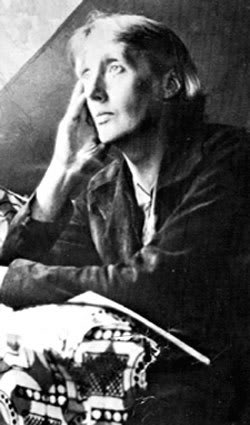But no living writer, try though he may, can bring back the past again, because no living writer can bring back the ordinary day. He sees it through a glass, sentimentally, romantically; it is either too pretty or too brutal; it lacks ordinariness. Virgina Woolf
When I was younger and put pen to paper (and back then it really was pen to paper) I always felt intimidated at the notion of trying to write a personal essay. The first essays that I eagerly read (outside of an academic context) were those of Virginia Woolf. I voraciously pursued all of her writing: fiction, biographies, diaries, essays, and all things Bloomsbury.
You can imagine my excitement in finding this final edition of Woolf's collected essays at the St. Michael's College Book Sale this fall when I realized that this was an edition printed by Woolf's own Hogarth Press and edited by her husband Leonard Woolf. I love everything about this book: it's size (5"x7 1/2"), the way it feels in my hands, the smell of the book, the green hard cover, its yellowed pages and even the slightly cryptic inscription left by a friend (or possibly lover?) in fading blue ink on the front page:
Was it a teacher who left the message for H.G.? A lover? A doting parent? Surely it was a man, one who sought to instruct, to advise and set one on the right course ...
Woolf, that most modern of writers, had a passion for late 18th c. and 19th c. eccentrics and geniuses and a deep reverence for the masters of art and literature. But why would she pursue such an obscure collection of thoughts and ruminations you may ask. (Although, confessedly, why would I want to read about the doings of artists and writers from almost a hundred years ago here you might also inquire).
You might understand her interest in the English art critic John Ruskin (with his "petulant eloquence"), the Russian writer Ivan Turgenev ("he chose to write with the most fundamental part of his being as a writer"), Thomas Hardy ("that faculty for putting the telescope to his eye and seeing strange, grim pictures") and her own father the writer/critic Leslie Stephens ("If one moment he rebuked a daughter for smoking a cigarette ... she had only to ask him if she might be a painter, and he assured her that so long as she took her work seriously he would give her all the help he could.") As a writer, her thoughts on "Modern Letters", "Reading" and the "Cinema" intrigue me but what of the other essays?
 |
| Woolf at work ... |
And because of Woolf, specifically because of Woolf, I have tried (tepidly, fearfully, at first) to write my own essays on small and obscure subjects - hence the blog and other small bits of ephemera. The smallness of the topics incite me to write further because even though the topics are odd and perhaps deemed irrelevant by some, she infuses beauty and clarity in all that she writes.










No comments:
Post a Comment